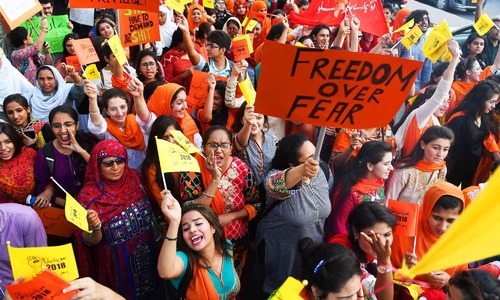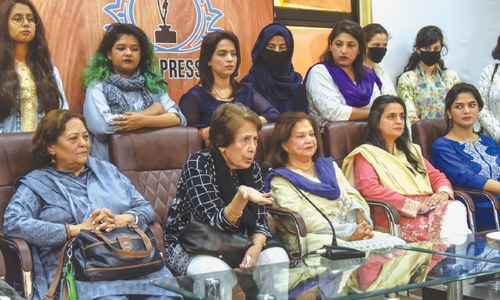
LAHORE: The Aurat March manifesto was launched formally on Thursday at the Lahore Press Club. The manifesto revolves around ‘Khud Mukhtari’ or the independence of women.
The 15-point manifesto demanded an end to the IMF-sponsored economic policies and budget cuts as well as immediate control of inflation of basic foods, whose burden was felt by working-class women as well as by gender and sexual minorities. It demanded a minimum of Rs40,000 fixed wages for workers.
Likewise, they spoke about bodily rights, especially in the context of the ongoing controversy regarding one of the slogans of Aurat March. The committee explained that demanding bodily rights was a basic human right, regardless of age. It extended to children as well, and was especially important to think of with regards to the widespread incidents of child sexual abuse and murder, all over the country.
Some reporters challenged the slogan and said that the march had been banned, to which the core committee explained that the march was not banned as per court clear directives, as this was their right. 
There was also some objections relayed to the committee regarding their slogan ‘mera jism meri marzi’ (my body, my right). An argument ensued following which women activists began chanting the slogan loudly, especially as they were being pushed to admit whether this slogan was part of their manifesto or not.
Farida Shaheed said it was obvious that those who proudly claimed they were anti-Aurat March did not even understand what the slogan meant.
At one point when journalists’ arguments began growing louder, she asked them, “Who has a right over your bodies?”
There was no reply. “Out of 15 points of the manifesto, they found only one to talk about,” said Ms Shaheed.
“They seem to be quite insecure and afraid about this side of the conversation. When you talk about human rights, we are referring to a person, and his or her body,” she said.
“We speak of rape cases and sexual harassment even of little girls, yet no one thinks of all that.”
Another core body member Neelum Hussain said that when demands challenge the status quo, there is always fear. “Journalism is male dominated and so they did not want to listen to our demand.”
Activists also mentioned double standards of society, saying that when Khadim Rizvi was swearing on TV, and when there was degradation of women, no one rose against that.
Other points of the manifesto demanded that safe and equal workplaces be provided through criminalisation of discrimination, defamation laws be decriminalized, domestic violence be criminalised in all territories, anti-harassment laws and sexual assault laws be amended to and include all genders to be complainants, concrete actions be taken to curb child sexual abuse and exploitation, campuses be demilitarised and surveillance of students be ceased, justice for all the families of those who have been victims of enforced disappearances, Kashmiris’ right to self-determination be upheld, community-led truth and reconciliation commissions be made to deal with violence by state and non-state actors, the Transgender Persons (Protection of Rights) Act, 2017 be implemented, all laws impinging on civic freedoms be repealed, and the preservation of, and transparency from big corporations on the use of, our natural resources. A representative of the core committee told Dawn: “After the dismissal of the Lahore High Court petition, it has been determined that we are a peaceful and legitimate march.”
“We are however still waiting for the city administration to give us our NOC in accordance with our Constitutional rights.”
Prominent representatives of the transgender community were also present.
Published in Dawn, March 6th, 2020













































